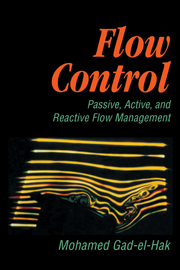Book contents
- Frontmatter
- Contents
- Preface
- Nomenclature
- 1 Introduction
- 2 Governing Equations
- 3 Unifying Principles
- 4 Coherent Structures
- 5 Reynolds Number Effects
- 6 Transition Control
- 7 Compliant Coatings
- 8 Separation Control
- 9 Low-Reynolds-Number Aerodynamics
- 10 Drag Reduction
- 11 Mixing Enhancement
- 12 Noise Reduction
- 13 Microelectromechanical Systems
- 14 Frontiers of Flow Control
- Epilogue
- Bibliography
- Index
3 - Unifying Principles
Published online by Cambridge University Press: 23 December 2009
- Frontmatter
- Contents
- Preface
- Nomenclature
- 1 Introduction
- 2 Governing Equations
- 3 Unifying Principles
- 4 Coherent Structures
- 5 Reynolds Number Effects
- 6 Transition Control
- 7 Compliant Coatings
- 8 Separation Control
- 9 Low-Reynolds-Number Aerodynamics
- 10 Drag Reduction
- 11 Mixing Enhancement
- 12 Noise Reduction
- 13 Microelectromechanical Systems
- 14 Frontiers of Flow Control
- Epilogue
- Bibliography
- Index
Summary
Mechanics is the paradise of the mathematical sciences because by means of it one comes to the fruits of mathematics.
(Leonardo da Vinci, 1452–1519)What experience and history teach is this—that people and governments never have learned anything from history, or acted on principles deduced from it.
(Georg Wilhelm Friedrich Hegel, 1770–1831)PROLOGUE
A particular control strategy is chosen based on the kind of flow and the control goal to be achieved. Flow-control goals are strongly, often adversely, interrelated, and there lies the challenge of making the tough compromises. There are several different ways for classifying control strategies to achieve a desired effect. Presence or lack of walls, Reynolds and Mach numbers, and the character of the flow instabilities are all important considerations for the type of control to be applied. All these seemingly disparate issues are what places the field of flow control in a unified framework. They will be discussed in turn in this chapter.
Control Goals and Their Interrelation
What does the engineer want to achieve when attempting to manipulate a particular flowfield? Typically he or she aims at reducing the drag; at enhancing the lift; at augmenting the mixing of mass, momentum, or energy; at suppressing the flowinduced noise; or at a combination thereof.
- Type
- Chapter
- Information
- Flow ControlPassive, Active, and Reactive Flow Management, pp. 25 - 33Publisher: Cambridge University PressPrint publication year: 2000
- 2
- Cited by



